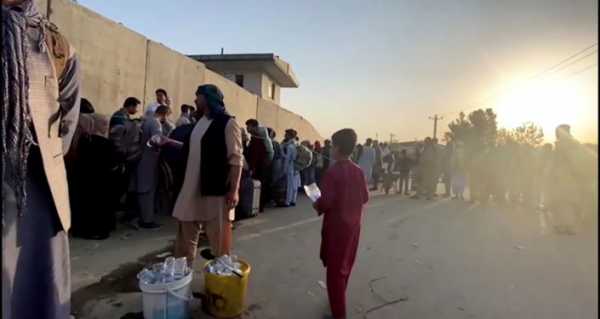
The 2015 migrant influx drove a major wedge between some of the EU members, after some countries openly opposed plans for distributing refugees according to quotas. Critical voices also insist that the migrant influx drove government spending and crime rates up significantly.
Several EU officials, including EU Commission chief Ursula von der Leyen, have suggested that the bloc’s member states must settle refugees potentially arriving from Afghanistan, but such an idea seemingly does not enjoy backing even among the strongest supporters of accommodating as many migrants as necessary in the past.
However, EU states fatigued by the events of the 2015 exodus of people from the Middle East and North Africa, especially Syria and Libya, learned a different lesson from those times. According to a German diplomatic memo obtained by the AP, instead of struggling with the migrant influx, EU interior ministers mulled providing timely humanitarian assistance to Afghans so they wouldn’t come in the first place.
European States Seek to Avoid Repeating 2015 Migrant Crisis
French President Emmanuel Macron said his country would gladly receive those Afghans who helped NATO forces, even posting a welcoming tweet, but rejected “irregular migratory flows”, against which the EU must defend itself, in his opinion. More than once France has been a scene of high-profile attacks and murders committed by Muslim migrants and even its own military veterans have drafted and signed an open letter warning Paris of the consequences of unchecked illegal immigration and its impact on society.

Right-wing demonstrators hold a sign “Rapefugees not welcome – !Stay away!” and a sign with a crossed out mosque as they march in Cologne, Germany Saturday Jan. 9, 2016. Women’s rights activists, far-right demonstrators and left-wing counter-protesters all took to the streets of Cologne on Saturday in the aftermath of a string of New Year’s Eve sexual assaults and robberies in Cologne blamed largely on foreigners. (AP Photo/Juergen Schwarz)
Germany has the chance to take a similar stance, even though it was one of the main proponents of admitting and settling the migrants which arrived en masse in 2015, despite witnessing a spike in crime rates and suffering an infamous night of massive sexual harassments on New Year’s Eve committed predominantly by freshly arrived migrants. Minister-president of North Rhine-Westphalia, and a potential chancellor candidate from the co-governing Christian Democratic Union (CDU) party this year, Armin Laschet, was among several politicians calling for the prevention of another 2015 scenario, with Afghanistan recently being seized by the Taliban.
Several EU countries’ politicians expressed the belief that instead of welcoming Afghans to Europe, the bloc must ensure they remain in the region – for example in Afghanistan’s neighbouring states. Austria namely suggested creating “deportation centres” in countries like Iran and Pakistan, where Afghans whose asylum applications had been denied could be safely deported to.
By the end of the 2015 migrant influx, EU countries devised a number of ways to reduce the strain on the receiving states by suggesting migrant quotas and the redistribution of refugees. These measures resulted in a major quarrel between the bloc’s members after Austria and a number of East European states refused to receive additional migrants and threatened to expel the ones they had already accommodated.

FILE – In this Thursday Aug. 27, 2015 file photo, migrants walk alongside railway tracks at Idomeni, northern Greece to cross the border and enter Macedonia. In the 28-nation EU, some countries have sought to block the unprecedented flow of migrants fleeing war or poverty in the Middle East and Africa. (AP Photo/Santi Palacios, File)
Another solution was an agreement between the EU and Turkey, under which Ankara agreed to settle thousands of Syrian migrants on its territory in exchange for financial support from the European Union and promises or speeding up the process of the country’s accession to the bloc. Still, Turkey remained unsatisfied with how Brussels handled its part of the bargain and repeatedly threatened to release the migrants at the border with Greece. Turkey also recently stated that it had no obligations to the EU to serve as its “refugee warehouse”, making a new round of collaboration between Brussels and Ankara on immigration improbable.
Greece itself became one of the main entry points for illegal migrants from the Middle East back in 2015. Now Athens fears a new wave of arrivals, this time from Afghanistan, and has already made it clear it does not want a repeat of the 2015 influx. Migration Minister Notis Mitarachi warned last week that Greece will not once again become a “gateway for irregular flows into the EU”.
So far, the only European country that has made it clear that it will be receiving refugees from Afghanistan is the UK, which dropped out of the EU last year. London said it has allocated 5,000 slots for Afghan refugees in 2021 and 15,000 more over the next few years. Considering the number of people that have already gathered at Kabul Airport in a desperate attempt to escape Taliban rule, the UK quota alone likely won’t be enough to accommodate all the people wanting to leave Afghanistan.
Sourse: sputniknews.com
0.00 (0%) 0 votes


































